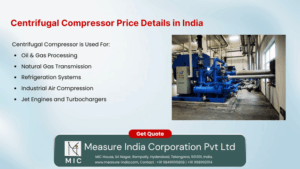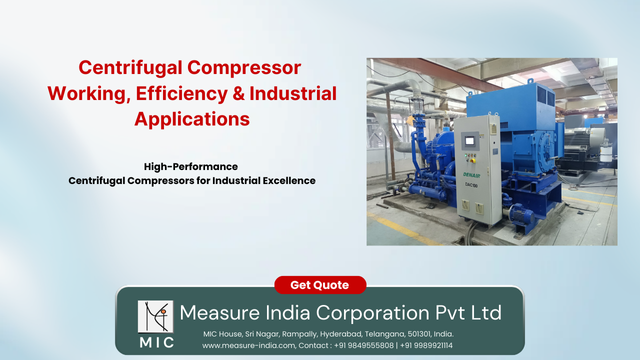
Centrifugal Compressor – Working, Efficiency & Industrial Applications

A centrifugal compressor is a high-speed rotating machine designed to compress gas using centrifugal force. Unlike reciprocating compressors, which rely on pistons, a centrifugal compressor operates with a continuous flow, making it highly efficient for large-scale industrial applications. It is widely used in gas turbines, industrial refrigeration, aerospace, oil & gas refining, and HVAC systems due to its ability to handle high flow rates with minimal maintenance.
The working principle of a centrifugal compressor revolves around the transformation of kinetic energy into pressure energy. When gas enters the compressor, it first passes through the impeller, a rotating disk with multiple curved blades. As the impeller spins at high velocity, the gas particles gain kinetic energy, moving outward in a radial direction. This outward motion increases velocity while lowering the pressure at the center of the impeller, allowing more gas to enter continuously.
Once the gas exits the impeller, it enters the diffuser, a stationary component designed to convert kinetic energy into pressure energy. The diffuser slows down the velocity of the gas, causing its pressure to rise significantly. The compressed gas is then discharged into the volute casing, where it is further guided toward the application system. This seamless conversion of velocity into pressure makes a centrifugal compressor highly efficient in continuous industrial operations.
When comparing a centrifugal compressor vs axial compressor, the fundamental difference lies in airflow direction and pressure build-up.
A centrifugal compressor increases pressure in a single radial stage, making it ideal for medium to high-pressure applications with moderate airflow.
An axial compressor compresses gas through a series of rotating and stationary blades in a linear path. These compressors are highly efficient in aerospace propulsion and high-speed gas turbines but require multiple stages to achieve the same pressure ratio as a centrifugal compressor.
The efficiency of a centrifugal compressor depends on factors such as:
Impeller design and speed
Gas properties and pressure ratio
Diffuser and volute casing optimization
A well-optimized centrifugal compressor can achieve efficiency levels above 85% in ideal conditions. This makes it one of the most energy-efficient choices for power generation, refrigeration, and petrochemical processing. The efficiency is influenced by inlet temperature, pressure ratio, and aerodynamics of the compressor design.
There are different types of centrifugal compressors, categorized based on the number of compression stages:
Single-stage centrifugal compressors – Used in HVAC systems and industrial air compression, where a moderate pressure increase is sufficient.
Multi-stage centrifugal compressors – Designed for high-pressure applications, such as gas processing, LNG plants, and chemical industries, where gas must be compressed multiple times before reaching the desired output pressure.
Centrifugal compressors are widely used in gas turbines, petrochemical plants, oil refineries, and power plants. They are also crucial in industrial refrigeration systems and HVAC applications
In gas turbines, these compressors play a critical role in delivering compressed air at precise pressures to ensure efficient combustion.
For centrifugal compressors in refrigeration, they are essential for maintaining cooling efficiency while consuming less energy. Their ability to provide continuous airflow at constant pressure makes them highly effective for refrigeration plants, HVAC chillers, and cold storage units.
Centrifugal compressors require minimal maintenance due to fewer moving parts compared to reciprocating compressors. However, performance monitoring is essential to prevent issues such as:
Impeller imbalance
Bearing wear
Seal leakage
Regular vibration analysis, thermodynamic performance checks, and lubrication monitoring can enhance compressor longevity and ensure operational efficiency.
The centrifugal compressor price varies depending on capacity, application, and brand. Industrial centrifugal compressors are available from leading suppliers and dealers across India, including cities like Hyderabad, Chennai, Pune, Mumbai, Bangalore, and Delhi.
If you are looking for a reliable centrifugal compressor supplier, visit Measure India Corporation Pvt. Ltd. for high-quality industrial compressors.
For industries requiring high-speed centrifugal compressors, modern designs operate at speeds above 50,000 RPM. These are used in aircraft engines, power plants, and industrial gas compression systems.
With advancements in aerodynamics, materials, and computational fluid dynamics (CFD) modeling, modern centrifugal compressors offer:
Higher efficiency
Lower energy consumption
Enhanced reliability
A centrifugal compressor is an essential component in various industries, offering high efficiency, durability, and consistent performance. Whether used in gas turbines, refrigeration, or power plants, it provides a reliable solution for high-pressure air and gas compression.
For high-quality centrifugal compressors in India, visit Measure India Corporation Pvt. Ltd. to explore the best solutions for your industrial needs.
Centrifugal Compressor Working Principle → Centrifugal Compressor Working
Centrifugal Compressor vs Axial Compressor → Comparison of Centrifugal and Axial Compressors
Centrifugal Compressor Applications in Different Industries → Industrial Applications of Centrifugal Compressors
Centrifugal Compressor Price & Suppliers in India → Best Centrifugal Compressor Suppliers in India
Industrial Air Compressors → Explore Industrial Air Compressors
Office Address : Centrifugal Compressor Price & Suppliers in India
MIC House, Sree Nagar, Ram pally,
Hyderabad – 501301, Telangana, India
Website: www.measure-india.com
Phone: +91-9989921114
Email: info@measure-india.com